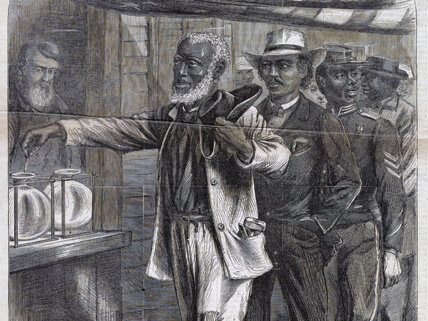“The First Vote”—African Americans line up to cast ballots.
The Fifteenth Amendment to the United States Constitution granted African American men the right to vote. Making that right a lasting reality, however, proved to be a huge challenge—and a failure of American democracy. Only with the Nineteenth Amendment, passed in 1920, was the right to vote also extended to African American women. But it was only after many years of civil rights advocacy that the exercise of the right to vote was guaranteed. The vantage point of 150 years since ratification of the Fifteenth Amendment provides perspective on the history of struggle for this foundational civil right.
As the Civil War came to a close, abolitionist Frederick Douglass stated the importance of the vote: “Slavery is not abolished until the black man has the ballot.” In reaction to the passage of Black Codes by white-supremacist governments in the South, Republicans in Congress pushed for African Americans’ civil rights. Under Reconstruction, for the next ten years many black Americans voted across the South, helping elect more than 20 African American men to Congress, and many others to state offices. In 1868, the Fourteenth Amendment granted citizenship to African Americans and guaranteed equality under the law. The Fifteenth Amendment, ratified in 1870, states that the right to vote could not be “denied or abridged by the United States or by any state on account of race, color, or previous condition of servitude.”
The language could not have been clearer, but the backlash in the states of the former Confederacy was strong. White supremacy reigned under the system of state-sanctioned discrimination that came to be known as Jim Crow. Southern states used literacy tests, poll taxes, and so-called grandfather clauses to severely restrict the voting rights of African Americans. Through intimidation and violence, groups such as the Ku Klux Klan threatened African Americans who attempted to exercise their right to vote.
Although these developments undercut the Fifteenth Amendment for decades, the modern Civil Rights movement in the 1950s and 1960s dismantled the Jim Crow system. The Twenty-Fourth Amendment, ratified in 1964, banned poll taxes in federal elections, and the Supreme Court extended this ban to the states two years later. Meanwhile, Congress passed the Civil Rights Act of 1964 and the Voting Rights Act of 1965, which banned literacy tests and other discriminatory practices. Voter turnout in the most recent national elections by African Americans, as well as other minorities, rose despite claims of “voter suppression.” In the present Democratic presidential primaries and the upcoming 2020 general election, the votes of African Americans likely will be critical.
Image credit: © Everett Historical/Shutterstock
Related Links:
- When Did African Americans Actually Get the Right to Vote?
Article exploring the significance of the 15th Amendment and the long struggle to make its promise a reality.
(Source: History.com, January 29, 2020) - What Everyone Should Know about Reconstruction 150 Years after the 15th Amendment’s Ratification
Essay on broad topics for teaching African American history; includes dozens of links to additional resources.
(Source: TheConversation.com, January 3, 2020) - The 15th Amendment and the Black Vote, or the Lack Thereof
This opinion piece emphasizes the importance of voting, despite the disappointing historical legacy of the 15th Amendment due to “Jim Crow” disenfranchisement.
(Source: Baltimore Sun, February 3, 2020) - The Promise and Pitfalls of the 15th Amendment over 150 Years
Summary of arguments that efforts to reduce voter fraud are intended to suppress minority voting rights.
(Source: Brennan Center for Justice, February 3, 2020) - Data Disprove the “Voter Suppression” Myth
Editorial by a Wall Street Journal columnist on contemporary claims of voter suppression.
(Source: Manhattan Institute, May 8, 2019) - Historic Highs in 2018 Voter Turnout Extended across Racial and Ethnic Groups
Research on voter turnout levels in the 2018 midterm elections.
(Source: Pew Research Center, May 1, 2019)




